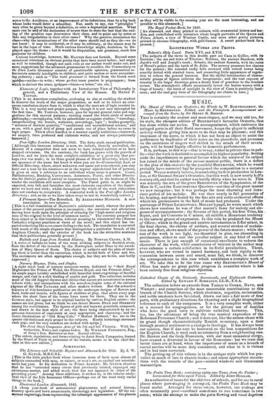MUSIC.
The Mount of Olives, an Oratorio ; the Words by W. BARTHOLOMEW, the Music by BEETHOVEN. Edited, and the Pianoforte Accompaniment ar- ranged from the Score, by Sir HENRY R. BISHOP.
THIS is certainly the neatest and most elegant, and we may add too, for its style, the cheapest edition of BEETHOVEN'S favourite Oratorio, that has come within our notice. The accompaniment, which embraces the stringed parts in all their florid movement, keeps the player in sufficient activity without giving him more to do than may be pleasant ; and this treatment of the score, in which it has not been an object to assist the performers by duplicates of their notes on the pianoforte, and presames on the assistance of singers well skilled in the attack of their severe parts, will be found highly effective in domestic performance. It is, perhaps, in this way—that is to say, rather in private than in pub- lic—that the work is destined to accomplish its highest popularity. Setting aside the impediments to general favour which the nature of its subject has raised in the minds of the serious musical public, there is a defect in the plan of this oratorio by the youthful BEETHOVEN, which he would probably have corrected had he postponed the composition to a maturer period. We can scarcely believe, remembering its first production in Lon- don, at Sir GEORGE SMART'S Oratorios, that this work is now nearly half a century old, and that its author was hardly thirty when he wrote it. This was scarcely the sera of the great BEETHOVEN of the Symphonies, of the Mass in C, and the RASUMOFFSKY Quartets—not that of the great master we now recognize ; but it was perhaps the most charming and luxu- riant period of his melody. He was then nearly in full possession of his hearing, and spell-bound by the fine airs and noble orchestral effects which his predecessors in the field of music had produced. Under the patronage of Prince LICHNOWSKY, MOZART'S pupil, he wrote much which shows how emulous he was of that master's fame for melody and ele- gance of accompaniments: the Sonatas of this period, his first Trios, his , Septet, and his Concerto in C minor, all exhibit a Mozartean tendency to the natural graces of expression. In this vein he produced the Mount of Olives; which in the grand and sombre introduction in E flat minor, in the final chorus, the chorus of soldiers, and several strokes of modula- tion and effect, shows much of the power of the future master ; while the rest of the work is too light, too theatrical in plan, too abounding in prettinesses, either to suit the peculiar subject or any kind of sacred music. There is just enough of occasional excellence to redeem the character of the work, while associations of interest in the author may even enhance a certain satisfaction in its florid peculiarities. Those, however, who are versed in sacred harmony, and look rigidly to the connexion between sense and sound, must fail, we think, to discover the correspondence in this case which establishes a complete work of art. We take this to be the true cause why BEETHOVEN'S Mount of Olives has made no great public progress in countries where it has been entirely free from religious objection.


























 Previous page
Previous page